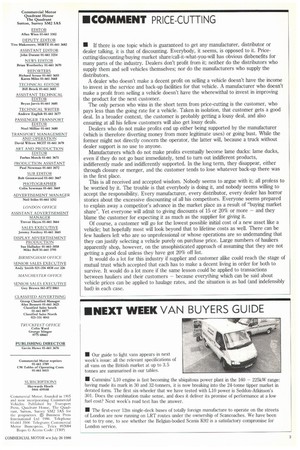• If there is one topic which is guaranteed to
Page 5

If you've noticed an error in this article please click here to report it so we can fix it.
get any manufacturer, distributor or dealer talking, it is that of discounting. Everybody, it seems, is opposed to it. Pricecutting/discounting/buying market share/call-it-what-you-will has obvious disbenefits for many parts of the industry. Dealers don't profit from it; neither do the distributors who supply them and sell vehicles themselves; nor do the manufacturers who supply the distributors.
A dealer who doesn't make a decent profit on selling a vehicle doesn't have the income to invest in the service and back-up facilities for that vehicle. A manufacturer who doesn't make a profit from selling a vehicle doesn't have the wherewithal to invest in improving the product for the next customer.
The only person who wins in the short term from price-cutting is the customer, who pays less than the going rate for a vehicle. Taken in isolation, that customer gets a good deal. In a broader context, the customer is probably getting a lousy deal, and also ensuring at all his fellow customers will also get lousy deals.
Dealers who do not make profits end up either being supported by the manufacturer (which is therefore diverting money from more legitimate uses) or going bust. While the former might not directly concern the operator, the latter will, because a truck without dealer support is no use to anyone.
Manufacturers which do not make profits eventually become lame ducks: lame ducks, even if they do not go bust immediately, tend to turn out indifferent products, indifferently made and indifferently supported. In the long term, they disappear, either through closure or merger, and the customer tends to lose whatever back-up there was in the first place.
This is all received and accepted wisdom. Nobody seems to argue with it; all profess to be worried by it. The trouble is that everybody is doing it, and nobody seems willing to accept the responsibility. Every manufacturer, every distributor, every dealer has horror stories about the excessive discounting of all his competitors. Everyone seems prepared to explain away a competitor's advance in the market place as a result of "buying market share". Yet everyone will admit to giving discounts of 15 or 20% or more — and they blame the customer for expecting it as much as the supplier for giving it.
Of course, a customer will go for the lowest possible initial cost of a new asset like a vehicle; but hopefully most will look beyond that to lifetime costs as well. There can be few hauliers left who are so unprofessional or whose operations are so undemanding that they can justify selecting a vehicle purely on purchase price. Large numbers of hauliers apparently shop, however, on the unsophisticated approach of assuming that they are not getting a good deal unless they have got 20% off list.
It would do a lot for this industry if supplier and customer alike could reach the stage of mutual trust which accepted that each has to make a decent living in order for both to survive. It would do a lot more if the same lesson could be applied to transactions between hauliers and their customers — because everything which can be said about vehicle prices can be applied to haulage rates, and the situation is as bad (and indefensibly bad) in each case.




















































































































